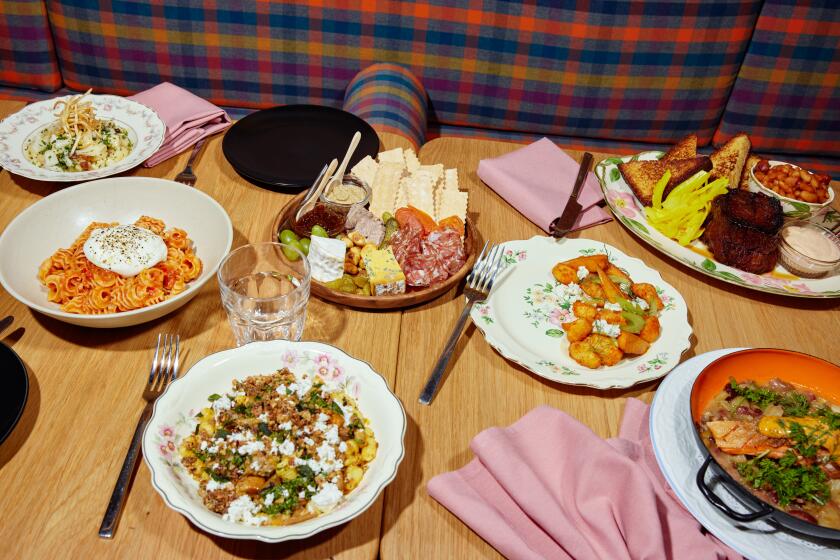France crafting prestige for skilled workers
- Share via
Reporting from Jarny, France — Most of the storefronts on Jean Jaures Avenue in this small mining town are boarded up and appear abandoned. But in the brightly lighted window of Franck Fresson’s pastry shop, tropical flowers intertwine with wild beasts made of sugar.
Inside, chocolate figurines and an array of cakes sit like colorful, edible jewels. Behind the counter, Fresson’s mother serves the customers who travel across the countryside to this shop, which belonged to Fresson’s grandfather before him.
Today, Fresson oversees every detail, arranging the glistening cakes in “harmonious,” color-sensitive order. His desserts, miniature sculptures, are layers of taste and texture that one must bite through all at once, he instructs. Even their exterior beauty is important, and a sign of the pleasure Fresson takes in his work.
“Making something beautiful is like breathing,” he says. “I know a lot of guys who make crap, and they aren’t happy. My guys are happy about what they do, they’re proud.”
He once didn’t have such confidence. Then he won the pastry competition for “Les Meilleurs Ouvriers de France,” or the “Best Craftsmen in France,” known as the MOF for short.
Surviving the contest, Fresson says, is not unlike coming back from war.
“It’s a mythic competition” that “changes how people see you,” he says.
The contest, which is held every three years and singles out France’s best in crafts varying from cuisine to carpentry and electrical work, was established in 1924 to give craftsmen a measure of prestige in the public’s eye.
“The idea of the founders was to show in a concrete, visible manner that a carpenter, an electrician, a chocolate maker, a baker -- well, they could reach a level of excellence comparable to what one can reach in mathematics and Roman history,” said Jean-Pierre Boisivon, a former president of the MOF.
Although the competition “pulls professions toward the top,” talented laborers are still under-recognized here, where students who do poorly in high school are put on a vocational education track at about the age of 14, Boisivon says.
Fresson, a sturdy 41-year-old whose hobbies include occasional opera singing, regularly tries to rid people of misconceptions about his line of work as being all fingers and no brain.
“Watch out, everything they told you is false,” Fresson tells eager parents who bring children to his pastry production lab for training. “ ‘If your son isn’t good in school, he won’t be good at my place,’ ” he tells them.
Fresson, who also has a larger shop and tearoom in the nearby city of Metz, trains students while they work for him. As a result, he and the students depend on each other’s success.
That relationship between master and apprentice struck a chord for Flora Lazar, who once had a career in education and youth development but, at 50, left the world of academia to follow a dream of enrolling in a French pastry school in Chicago.
Watching French pastry teacher Sebastien Canonne, a winner of the MOF competition, Lazar came to think that he was “every bit the genius” her “most brilliant professors” at Harvard had been. She says she decided to spend time “observing him to understand him.”
During the years that she oversaw public affairs at the Chapin Hall center for children at the University of Chicago, Lazar had grappled with the way society undervalues skilled crafts and vocational education paths.
“I have had a long interest in vocational education, and why we do it so poorly in the U.S., as well as why we are so guilty about offering it as a career path to youths,” she said.
Could the MOF provide a missing ingredient for dignifying skilled labor relegated to the margins of society, and rectifying some failures of vocational education?
Nearly 40 interviews with France’s top dessert chefs later, Lazar produced a film about the MOF pastry competition. She also now sells her own confections and pastries from the Chicago-based business Flora.
“Kings of Pastry,” directed by Chris Hegedus and D.A. Pennebaker, was screened at the Berlin International Film Festival last month and will have its U.S. premiere in April at the opening of the Durham Full Frame Documentary Film Festival in North Carolina.
The film will no doubt attract viewers for its peek into the kitchens of eminent French chefs. Their elaborate, mouthwatering concoctions, and the stories of competitors devoting months and even years to MOF-worthy recipes, leave viewers on the edge of their seats. (A minor error during the contest could shatter a sugar sculpture, or sharply reduce allotted cooking time, so that even finishing all required elements in the final dessert display is a nail-biting gamble.)
But Lazar also hopes that for some, the film will shine an inspiring light on the craftsman competition itself, as a means to help give greater options to people with diverse learning skills.
Lazar says that the U.S. has culinary competitions, but they don’t come close to the stature of the MOF. “In France, the MOF institution still does represent something that people dream of doing. . . . There’s nothing to dream of in the U.S. when you go through a vocational education,” she says.
In education policy, “we don’t actually look at the most basic questions like: What is the motivation of young people to do well?”
“The people they see in their lives -- they show them what they could be.” And even though not everybody learns with “their fanny on a chair,” Lazar says, “everybody deserves to see what the best is, and to brush up against it.”
Lauter is a special correspondent.
More to Read
Eat your way across L.A.
Get our weekly Tasting Notes newsletter for reviews, news and more.
You may occasionally receive promotional content from the Los Angeles Times.










